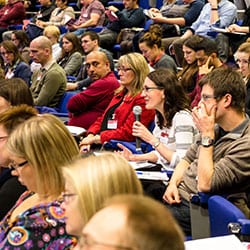UCL Infection, Immunology and Inflammation Symposium 2014
By ucyow3c, on 2 December 2014
Written by Yusuf Topal, first year PhD student
Discoveries in infection, immunology and inflammation (III) are defining 21st-century medicine, shifting the paradigm of almost every clinical discipline.
This is reflected by the broad scope of research taking place at UCL, as showcased at this year’s UCL III Symposium, held at the UCL Institute of Child Health on 24 November.
The UCL III Theme is a large cross-disciplinary research community, which helps to facilitate interaction and collaboration across UCL and its partner hospitals and organisations.
The amalgamation of III scientists and clinicians across UCL have already unlocked some of the long kept secrets of diseases such as HIV, cancer, malaria, TB, asthma and arthritis. Such a collaborative culture also provides a rich platform for aspiring PhD students and postdoctoral scientists.
The annual UCL III Symposium brings the community together and displays some of the world-class research around UCL. Befitting its major success in previous years, the list of eminent academics at this year’s symposium set the stage for an enthralling showcase to a busy auditorium of around 300 attendees.
Advances in immunology
The morning session on immunology included a presentation by Professor Claudia Mauri (UCL Division of Medicine), who showed that gut microbiota promote regulatory B cell differentiation, which helps maintain equilibrium between clearing infections, while minimising inflammatory damage.
This was followed by Professor Lucy Walker (UCL Division of Infection & Immunity) who described how her lab was able to identify follicular T helper cells as one of the key players in autoimmune diabetes – thus raising the exciting prospect of a viable biomarker for this disease.
Dr Paola Bonfanti (UCL Institute of Child Health/UCL Institute of Immunity and Transplantation) then demonstrated the rapidly progressing research into stem cells and tissue engineering, and how the cells that constitute the thymus, a specialised organ of the immune system, can be reprogrammed.
Early career researcher presentations and poster exhibition
Following swiftly on the heels of excellent talks, the attention of the audience was drawn to the early career poster exhibition and then the early career presentation session. The judging committee clearly had a tough decision, choosing just one winning poster and one winning presentation.
After much deliberation, Dr David Bending (UCL Institute of Child Health) was named as the winner of the poster competition, with Laura Pallet (UCL Division of Infection & Immunity) as the runner-up.
Dr Emma Nicholson (UCL Division of Infection & Immunity) then won the presentation competition, with Dr Jimstan Periselneis (UCL Centre for Inflammation & Tissue Repair) named as the runner-up.
Message from the Provost: UCL 2034
Midway through the symposium, UCL President & Provost Professor Michael Arthur gave the keynote speech, describing how the III domain would fit and thrive within UCL 2034, the new 20-year strategy for UCL.
One of its principal themes concerns the intellectual excellence of UCL academics and he hopes that London will rival cities such as Boston to become the global heartbeat of medical discoveries.
“All children should have genome sequencing at birth”
After lunch there was an interactive debate on whether all children should have genome sequencing at birth. Professor Mark Caulfield (Chief Scientist for Genomics England) argued the case ‘for’ and Professor John Martin (UCL Division of Medicine) argued ‘against’.
The question was first thrown to the audience with their interactive voting pads at hand. Interestingly, 58% of the audience voted against the proposition.
It was then up to Professor Caulfield to convince the slight majority otherwise. He argued that we shouldn’t sequence the genome of every child at birth but instead, sequence the genome of children with rare diseases when a diagnosis cannot be made.
Arguments against circled around consensual issues as well as the fact that you could inadvertently diagnose diseases such as Alzheimer’s, which may affect the psychology of the child throughout their life.
Not surprising, then, when the vote was retaken at the end of the session, 67% of the audience voted against.
Infection and inflammation
The final session consisted of talks on infection and inflammation. Professor Judy Breuer (UCL Division of Infection & Immunity) opened with discoveries made in the evolution of the human cytomegalovirus and how it adapts to populate new niches within the body.
She explained that being able to track the virus in this way may help optimise antiviral therapy in the near future for patients infected with deadly viruses.
The plenary session finale was an excellent talk about a distinct subset of T cells as the Jekyll and Hyde of childhood arthritis by Professor Lucy Wedderburn (UCL Institute of Child Health).
Given that these cells are important to a balanced immune system, Professor Wedderburn has discovered that they also produce inflammatory molecules within the joints of children with arthritis.
The III symposium provides a unique forum that facilitates fruitful exchange of ideas between basic and translational research to bridge the gap between discovery and therapy.
The wide range of topics explored across multiple disciplines this year is testimony to the breadth and depth of the research activity at UCL.
 Close
Close


